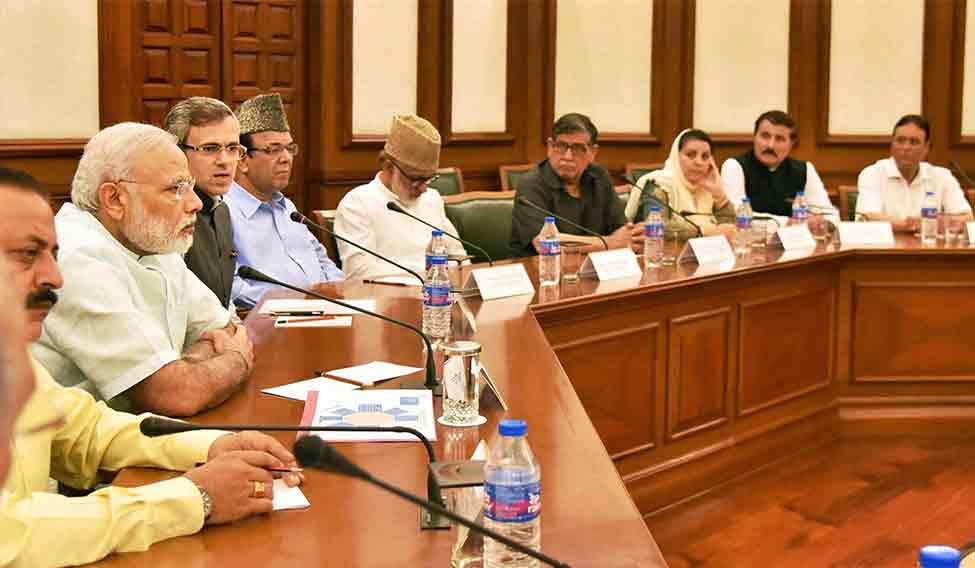For the first time since the ongoing unrest began, Prime Minister Narendra Modi has sounded compassionate towards the people of Kashmir. In a statement, Modi expressed “deep concern and pain” over the loss of life in the 45-day-long agitation that was sparked by the killing of Hizbul Mujahideen commander Burhan Muzaffar Wani and two of his associates in an encounter on July 8.
The statement came after a delegation of the opposition parties of Jammu and Kashmir, led by former chief minister Omar Abdullah, met him on August 22, in New Delhi. The Prime Minister, in the statement, said those who lost their lives “are part of us, our nation”. “Whether the lives lost are of our youth, security personnel or police, it distresses us,” he said. He emphasised the need for dialogue to find a “permanent solution to the issue within the Indian Constitution”.
Modi's expression of sympathy and desire for a permanent solution are unlikely to calm tempers in Kashmir anytime soon. It is also unlikely to rescue the besieged PDP-BJP coalition government led by Chief Minister Mehbooba Mufti, whose own credibility lies in tatters.
Modi's sympathy and outreach on Kashmir have further weakened Mehbooba's position within her party and in the eyes of her supporters. Recently, she had met Home Minister Rajnath Singh, in Delhi, to discuss the Kashmir situation but could not get an audience with the prime minister. She appealed to the prime minister to follow the path of insaniyat (humanity) of former prime minister Atal Bihari Vajpayee, and initiate dialogue with the Kashmiri separatists.
Modi responded to her at a rally in Alirajpur district of Madhya Pradesh, the birthplace of freedom fighter Chandrashekhar Azad, on August 8. ''We are the people who are walking the path of insaniyat, jhamooriyat (democracy) and Kashmiriyat (peaceful coexistence),” he said. Observers in Kashmir interpreted that as a snub to Mehbooba. Modi had also earlier snubbed former chief minister Mufti Mohammad Sayeed, Mehbooba's father, who had urged the Centre to reach out to Pakistan and the separatists. Modi had said, ''I don't need lessons on how to deal with Pakistan and separatists.''
Political observers in Kashmir are baffled as to why Modi didn't express sympathy for the people of Kashmir after Mehbooba made a fervent appeal to him in New Delhi. That the opposition National Conference and Congress have outsmarted her on the present crisis in Kashmir has further weakened her position. But Mehbooba put personal interests aside, stating that the opposition's meeting with the prime minister would do good if a solution to the crisis could be arrived at.
Abdullah said the prime minister told them that development alone would not resolve the problem. “I am not going to put words into the prime minister’s mouth nor am I going to draw further meaning from what he said. We talked about the same thing that we have been talking with other leaders ever since we arrived in Delhi. That the issue of Jammu and Kashmir, especially in light of the present crisis, needs to be understood correctly, after which a solution is required,” Abdullah said. ''We emphasised that the issue of Jammu and Kashmir is political in nature. Time and again such situations arise but if we are unable to find a political solution to it, we will only be repeating our mistakes.”
Abdullah seemed satisfied with his meeting with the prime minister and said he was “grateful to Narendra Modiji for taking time out to receive the delegation from Jammu and Kashmir and giving us a patient hearing beyond allotted time”.
Modi's outreach, however, has not enthused the separatists and the protesters in Kashmir. ''We have heard it many times that a solution will be found within the Indian Constitution. They think people are dying for the Indian Constitution in Kashmir,'' said Latief Ahmed, a protester in Srinagar. ''Yesterday, a tear-gas shell ruptured the heart of a young boy in my area, Fateh Kadal. Did he die for a solution within the Indian Constitution?'' As Latief talked to THE WEEK, a group of youngsters raised slogans. Such sentiment is all-pervasive across Kashmir, with far greater intensity in rural areas of south Kashmir.
Hard-liner Syed Ali Shah Geelani is of the opinion that for a lasting solution to the Kashmir issue, the Centre must shun violence and adhere to the UN resolutions on Jammu and Kashmir. ''We understand that the universal principle of right to self-determination is the only road through which peace can be achieved in Jammu and Kashmir,” Geelani said.
Shabir Shah, another veteran separatist, said that people were not sacrificing their lives for any kind of development or employment. ''It [the unrest] is for the achievement of that right which has been acknowledged by the international community,” Shah said. Mirwaiz Umar Farooq, a moderate separatist, said that achieving long-lasting peace in the state would be possible only if New Delhi acknowledged the political nature of the Kashmir issue and stopped violations of human rights.








